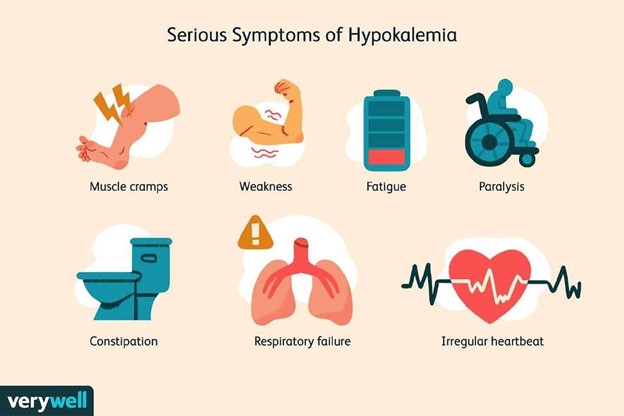A client is admitted with dehydration and hypokalemia.
Which of the following signs and symptoms would the nurse expect to find (Select all that apply).
Muscle weakness.
Constipation.
Hyperreflexia.
Cardiac dysrhythmias.
Nausea and vomiting.
Correct Answer : A,B,D

These are all signs and symptoms of hypokalemia, which is a condition where the blood potassium level is too low. This can affect the function of the muscles, nerves, and heart. Therefore, the nurse would expect to find these signs and symptoms in a client with dehydration and hypokalemia.
Choice C is wrong because hyperreflexia is not a sign or symptom of hypokalemia.
Hyperreflexia is a condition where the reflexes are exaggerated or overactive.
This can be caused by conditions such as spinal cord injury, stroke, or electrolyte imbalances such as hypocalcemia or hypomagnesemia.
Nursing Test Bank
Naxlex Comprehensive Predictor Exams
Related Questions
Correct Answer is D
Explanation

Protein intake can increase the excretion of calcium and oxalate in the urine, which can promote the formation of calcium oxalate stones. The client should limit animal protein sources, such as meat, poultry, fish, eggs, and dairy products.
Choice A is wrong because purine-rich foods, such as organ meats, shellfish, and beer, can increase the production of uric acid, which can cause uric acid stones.
Choice B is wrong because a low-calcium diet can increase the absorption of oxalate in the intestine, which can increase the risk of calcium oxalate stones.
The client should consume a moderate amount of calcium from dietary sources, such as milk, cheese, yogurt, and green leafy vegetables.
Choice C is wrong because potassium-rich foods, such as bananas, oranges, potatoes, and tomatoes, can help prevent calcium oxalate stones by increasing the urinary pH and citrate levels.
The client should consume adequate amounts of potassium from dietary sources.
Correct Answer is ["A","B","D"]
Explanation

These are all signs and symptoms of hypokalemia, which is a condition where the blood potassium level is too low. This can affect the function of the muscles, nerves, and heart. Therefore, the nurse would expect to find these signs and symptoms in a client with dehydration and hypokalemia.
Choice C is wrong because hyperreflexia is not a sign or symptom of hypokalemia.
Hyperreflexia is a condition where the reflexes are exaggerated or overactive.
This can be caused by conditions such as spinal cord injury, stroke, or electrolyte imbalances such as hypocalcemia or hypomagnesemia.
Whether you are a student looking to ace your exams or a practicing nurse seeking to enhance your expertise , our nursing education contents will empower you with the confidence and competence to make a difference in the lives of patients and become a respected leader in the healthcare field.
Visit Naxlex, invest in your future and unlock endless possibilities with our unparalleled nursing education contents today
Report Wrong Answer on the Current Question
Do you disagree with the answer? If yes, what is your expected answer? Explain.
Kindly be descriptive with the issue you are facing.
